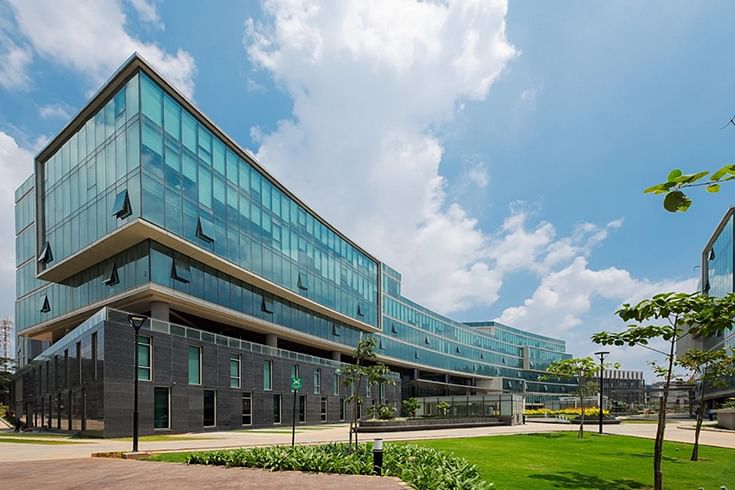India can emerge as global hub for 48V EV tech: Magna CTO
Global Tier 1 giant recently opened a new e-mobility engineering centre in Bengaluru with simultaneous focus on tapping growth in micro-mobility solutions.
Global Tier 1 giant recently opened a new e-mobility engineering centre in Bengaluru with simultaneous focus on tapping growth in micro-mobility solutions.
Early last month, Magna International opened a new engineering centre in Bengaluru, outlining an investment of Rs 970 crore. The company aims to drive innovation for e-mobility projects with this facility where technical experts will work on powertrain electrification, electronics, and software-defined vehicle development, when it commences operations in the Q1 of 2023.
In a recent conversation with Autocar Professional, following the inauguration of the facility, Magna International CTO, Anton Mayer said that India stands a huge chance to become the global hub for supplying cost-effective, 48V, electric two-wheeler technology as there lies a huge captive market as well as proven export capabilities.
“We expect the Indian market to have a completely different approach to electrification, with two-wheelers being the key drivers of this technology.
“When it comes to e-two-wheelers, we often talk about the 48V technology and it must be extremely cost effective with regards to the battery, electric motors, and inverters. Right now, the complete global supply chain is stressed and that offers a big opportunity for India,” Mayer said.
“While China has done a great job on the high-voltage side, India can tap the potential and emerge as the perfect global hub for the 48V technology,” he added.
 Magna Innovation Campus Bengaluru, which is to open in Q1 2023, will employ engineers and technical experts working on software and system development, simulation, testing and vehicle integration, as well as digital, data and cloud solutions for EV programs.
Magna Innovation Campus Bengaluru, which is to open in Q1 2023, will employ engineers and technical experts working on software and system development, simulation, testing and vehicle integration, as well as digital, data and cloud solutions for EV programs.
Mayer asserted that the electric vehicle (EV) drivetrain sub-systems such as thermal management systems, battery enclosures and software-oriented battery control systems could be the key focus areas for the country to gain relevance in the growing demand of e-mobility components within India and around the world.
“We do see huge potential in the electric two-wheeler space in India. Even if the share of e-two-wheelers reaches 5 percent of India’s total two-wheeler sales, it would still be a huge number,” Mayer said.
Globally, Magna International is betting big on the e-mobility segment with projected revenues of US$ 2.3 billion (Rs 18,949 crore) by 2024 on the back of supplies of EV components, with further targets of doubling revenues by 2027, and the company says a lot of its business is already booked.
In July 2021, it had signed a JV with Korea’s LG Electronics to develop electric motors, power electronics and integrated solutions for the battery electric vehicle space globally. The new company – LG Magna e-Powertrain – is headquartered in Incheon, South Korea and aims to quickly react to market trends and capitalise on the global shift towards vehicle electrification.
Keen to tap micro-mobility market growth
In correlation, India is also high on Magna’s radar for micro-mobility solutions and the company had made a strategic investment in Indian start-up Yulu earlier this year in September, with the latter aiming to strengthen and expand its operations by growing its vehicle fleet of compact e-bikes from the present 10,000 units to over 100,000 units across the country within the next 12 months. The two companies are also set to establish a network of 500 battery charging and swapping stations under a new entity – Yulu Energy Corporation.
According to Mayer, “We think it is extremely important to have Battery-as-a-Service (BaaS) and battery-swap solutions to make it comfortable and convenient for end customers. Yulu’s plan is to grow its fleet by a factor of 50 over the next two years, therefore, taking the total count to half-a-million vehicles over the next 24 months.”
“Making this happen is going to take a huge amount of effort, investment as well as a lot of discipline from all stakeholders. That it will not end at 500,000 units is also very clear. We have a lot of detailed plans,” he added.
Mayer further remarked and said that the micro-mobility concept essentially starts from urban areas and one needs to have a certain vehicular density to make it practical. For instance, a bike must be accessible at every few hundred metres, and not, say, at every 2km distance. “Therefore, we will start with urban areas and then investigate how far we can go with this concept, considering the vast geographical Indian landscape,” he explained.
With a growing number of vehicle manufacturers, including the legacy players in the conventional two-wheeler segment now entering the e-two-wheeler segment, Magna also envisions the possibility of offering its BaaS network to other players as well.
“There is a need to standardise connectors for battery-swap stations. We must be front runners in this area and if it happens, there is certainly a possibility to expand this business model outside of Yulu,” Mayer signed off.
ALSO READ:
Electric two-wheeler sales charge past 275,000 units in H1 FY2023
Yulu gets fresh Rs 653 crore funding led by Magna International and Bajaj Auto
RELATED ARTICLES
Cosmo First diversifies into paint protection film and ceramic coatings
The Aurangabad, Maharashtra-based packaging materials supplier is leveraging its competencies in plastic films and speci...
JSW MG Motor India confident of selling 1,000 M9 electric MPVs in first year
The 5.2-metre-long, seven-seater luxury electric MPV, which will be locally assembled at the Halol plant in Gujarat, wil...
Modern Automotives targets 25% CAGR in forged components by FY2031, diversifies into e-3Ws
The Tier-1 component supplier of forged components such as connecting rods, crankshafts, tie-rods, and fork bridges to l...






 03 Nov 2022
03 Nov 2022
 8833 Views
8833 Views














 Autocar Professional Bureau
Autocar Professional Bureau




